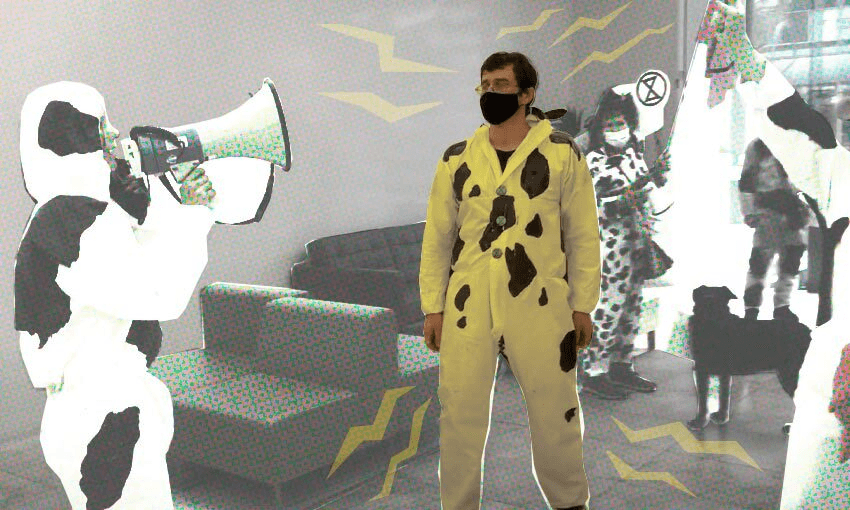Ōtautahi psychotherapist Michael Apáthy was arrested on Wednesday for chalking a message to Fonterra outside its Wellington office building as part of an Extinction Rebellion protest.
Activist Michael Apáthy got arrested last Wednesday. The charge? Wilful damage. His act? Spray-chalking “Fonterra cows send regards” outside the dairy giant’s Pōneke office building. His motivation? The impact that industrial dairying is having on New Zealand’s environment and the more than six million cows farmed on it.
Apáthy’s arrest – one of several throughout Extinction Rebellion New Zealand’s week-long “spring rebellion”, including some protesters who superglued their hands to parliament’s steps – is a “terrible irony”, says Apáthy. “That this non-permanent, totally washable message can get me charged with wilful damage and [then I] have to defend myself in court… I’m happy to have my day in court, but where’s the day in court for Fonterra?”
The 41-year-old is a psychotherapist in Ōtautahi, helping people understand their stress, panic or anxiety. Apáthy also offers some clients “ecotherapy”, an approach that recognises the importance of the environment to our healing. Based on his work, he says young people are increasingly realising their futures are being jeopardised as older generations hand them degraded environments that will take generations to restore. That then erodes any hope they may have of turning things around, he says, and a sense of hope is critical to anyone living with depression, trauma or climate anxiety.
“As a psychotherapist, most of my time is [spent] just sitting in a room doing one-to-one counselling like any therapist. But I got to the point where I felt like that was not enough… It’s important that particularly younger people see people from the older generations actively getting involved, putting themselves on the line, taking responsibility.”
Last week, around 20 protesters in various bovine get-ups – some carrying signs that said “Cows on strike” and “Dairy gone mad”, some dancing to the Bee Gees’ ‘Stayin’ Alive’ and all wearing face masks – called out the likes of the Ministry of Primary Industries and government-owned farmer Pāmu, organisations they said needed to take some responsibility.
NZX-listed co-operative Fonterra was part of the “Discowbedience” protest too. The cows-on-strike group entered the lobby of the office building housing the co-op at 157 Lambton Quay while a protester on a megaphone laid out their demands. They wanted Fonterra to “sort out their shit” and Apáthy says they were open to having a conversation. Video footage shows the activists dancing while various people weave between them on their way to and from work.
Apáthy says no one at Fonterra would engage with them, “and that’s when your last resort is doing civil disobedience. So, as we left, I spray-chalked the ‘cows send their regards’ message.” He was arrested about a minute later, he says.
“The police came and talked to me and the security [guard] had pointed out [the message] and I wasn’t at all interested in denying that I’d done it. That was fine. I let the police know that it wasn’t spray paint, it was chalk that would just wash out but they still decided to charge me. And, of course, I came peacefully and respectfully with them.”
Underpinning Apáthy’s message were his various claims of Fonterra’s “wilful damage”:
- the rivers that we can’t swim in.
- the nitrates in our drinking water that research has shown can lead to higher colorectal cancer rates.
- the pregnant cows forced to live in deep mud all winter in Southland and the two million calves killed each year at only a few days old.
- the use of palm kernel, a material linked to rainforest destruction in Indonesia.
“Those are Fonterra’s legacy. That is the wilful damage done by industrial dairying,” he says.
Stuff’s 2018 special investigation reported that chief among dairying’s effects are the nearly 1,000 litres of water needed to produce one litre of milk; the effluent that pollutes soil, aquifers and waterways; the greenhouse gases that cattle emit; and the hundreds of thousands of tonnes of coal required to process liquid milk into powder.
A Fonterra spokesperson said the company didn’t file the charge against Apáthy as it doesn’t own the building that houses its HQ. “We respect New Zealanders’ right to protest peacefully,” they said, adding that Fonterra was making “good progress” on its sustainability initiatives as outlined in its 2021 report.
That report said:
- nearly three-quarters of co-op farmers (up from 68%) were engaging with the Department of Conservation on improving their waterways, and almost half (48%) were doing so;
- using plaintain in cows’ feed is being trialled as research has shown the nutritious herb can reduce the concentration of nitrogen in the animal’s urine, in turn reducing nitrogen leaching and helping to inhibit soil bacteria from converting nitrogen into nitrate;
- over half of farms (53% – up from 50%) have an “animal wellbeing plan” and Fonterra’s “cared for cows” standard goes beyond the government’s minimum animal welfare regulations, identifying potentially at-risk farms and providing them with more support; and
- 71% of its 27,487 tonnes of palm products, a raw material Fonterra has recognised is linked to deforestation, was certified as being sustainably sourced.
Apáthy, who is due to appear in court today, says chalking was always an option in the back of his mind. “The reality is that Fonterra has been ignoring the experts pointing out the damage they’re doing, and they’ve been greenwashing for such a long time now. What’s really going to make them pay heed is when increasingly the public comes to understand what’s happening. So, to send a really public message seems important.”



